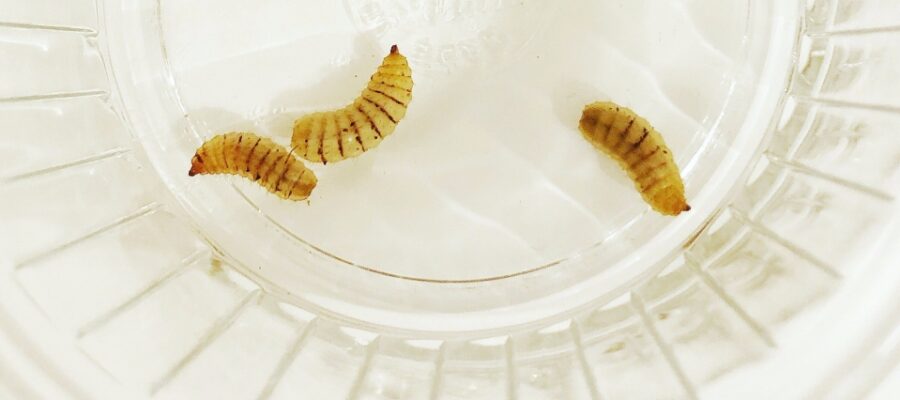This week I’ll be discussing phoenix worms (also known as calci worms) as part of my feeder insect review series.
It’s really important to feed your geckos a varied diet of live food, because each different insect offers different nutrition and benefits, and also it’s nice for your geckos to have some variation, as their tastes and preferences can change as they age.
For some frequently asked questions I receive around my leopard geckos’ diets, please see my Leopard Gecko Feeder Insects FAQ post.
Phoenix worm care
My initial thought on phoenix worms was “ugh these are going to be a hassle” because they have to be kept in a soil-like substrate, and need washing before feeding to your leopard geckos, but honestly it takes about 5 minutes, and the time spent doing this is mitigated by the fact that these worms don’t need feeding (more on that soon).
To wash them, I just rinse them under a very gentle stream of tap water, and then dry them in some paper towels to take away any remaining dirt and moisture, and then put them into a feeding dish (I use glass ramekins for my feeding dishes). They need to be completely dry if you don’t want them to climb the surfaces.
They will last 4-5 weeks in cool but not cold temperatures, meaning you can’t put them in the fridge like you would with mealworms or waxworms to slow down their growth cycle.
Phoenix worms are shipped purged, which means that they have nothing in their stomachs. They do not need gutloading or feeding, and doing so is discouraged, because if you do this their digestive system will start working again and the faeces will start to contaminate the soil-like substrate that they’re shipped in.
Nutrition
One of the great things about phoenix worms is that they have an almost perfect Ca:P ratio (Calcium: Phosphorous), meaning they’re one of the best things you can feed to your leopard geckos.
Due to the incredible calcium content, these worms have been known to prevent and even reverse metabolic bone disease (if you don’t know what this is then google it and hope that your geckos are nourished enough that they will never get this awful disease!)
They also contain lauric acid, which prevents viruses, and has a number of other properties which benefit your leopard geckos’ health, and finally they have a relatively low fat content.
They don’t smell/ make noise
Unlike insects like crickets, phoenix worms don’t make any noise or smell, so you can’t even tell that they’re there.
They move around lots
These worms wriggle around more than any of the other feeder worms I use. This is great for catching the eye of your gecko and encouraging it to feed.
Cost
As phoenix worms only last about 4-5 weeks before turning into a black soldier fly, it’s best to buy them in smaller quantities so that none go to waste. This means that they can get quite expensive if you want to use them regularly, but I think the benefits by far outweigh this factor.
You know when the worms are getting more mature as they start to turn darker and darker until they’re almost black, so make sure you keep a eye on this.
Summary
A great feeder insect, because they are easy to care for and do not need feeding or gutloading, their nutritional profile is exceptional, they don’t make noise and they are visually stimulating for the geckos. The only slight downside for me is they don’t last as long as other insects before turning into flies, making the cost quite high if you want to feed these regularly.
Ease of care: 10/10
Nutritional profile: 10/10
Smell/ Noise: 10/10
Movement: 9/10
Ease of containing: 7/10
Cost: 7/10



